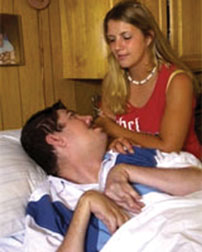|
observer |
|
|
|
|
|
OTHER LINKS |

|

|

|
Man's brain rewires itself after 19 years in comaWallis, who is now 42, is one of the few people known to have recovered so dramatically so long after a serious brain injury. "It's big news that somebody can make important, meaningful changes in their function after 20 years following a severe brain injury," Schiff said.
"He was able to grunt but only inconsistently," Dr. Nicholas Schiff of the Weill Cornell Medical College said of Terry Wallis. In 1984, Wallis was a teenager when his car plunged into a river bed. The accident cut several nerve endings in his brain, leaving him in what doctors call a minimally conscious state. He stayed that way for almost 20 years, neither moving nor communicating. "If you put something in front of his face, he didn't blink," said his mother, Angilee Wallis. Then, in 2003, he spoke. Scientists finally think they've figured out how. Analysis suggests tiny nerve connections in Wallis' brain have re-grown and replaced the ones sheared apart by the accident. Wallis, who is now 42, is one of the few people known to have recovered so dramatically so long after a serious brain injury. "It's big news that somebody can make important, meaningful changes in their function after 20 years following a severe brain injury," Schiff said. "The big picture might be that some patients may be reconnecting parts of their brain." Wallis still needs help eating and cannot walk, but his speech continues to improve and he can count to 25 without interruption. He can now move his legs. The findings, published in the Journal of Clinical Investigation, raise hopes for a greater understanding of brain damage recovery. However, researchers say they could not pin down the exact type of tissue regeneration that had taken place, nor do they know how to make other patients like Wallis recover. The research
"I wouldn't want to over enthuse family members or folks who think now we have a cure for this." The research on Wallis was led by imaging experts Henning Voss and neurologist Schiff at the Weill Medical College of Cornell University in New York City and included doctors at JFK Medical Center in Edison, N. J. The researchers used a new type of brain imaging only available for research purposes to establish the regrowth. The equipment tracks the direction of water molecules in and around brain cells -- an indicator of brain activity. "It's a road map of how the connections are running," Schiff told reporters. In Wallis' brain, "what we first see is how overwhelmingly severe this injury was," with many abnormalities compared to the healthy people, Schiff said. The second set of images showed changes from the first, strongly suggesting that new connections had formed. These correlated with areas of the brain that affect the ability to move and talk. (Courtesy CTV) |
 A man who was barely conscious for nearly 20 years has made a
dramatic recovery after his brain spontaneously rewired itself,
scientists believe.
A man who was barely conscious for nearly 20 years has made a
dramatic recovery after his brain spontaneously rewired itself,
scientists believe.  "Right now these cases are like winning the lottery," Dr. Ross
Zafonte, rehabilitation chief at the University of Pittsburgh Medical
Center, told the Associated Press.
"Right now these cases are like winning the lottery," Dr. Ross
Zafonte, rehabilitation chief at the University of Pittsburgh Medical
Center, told the Associated Press. 






